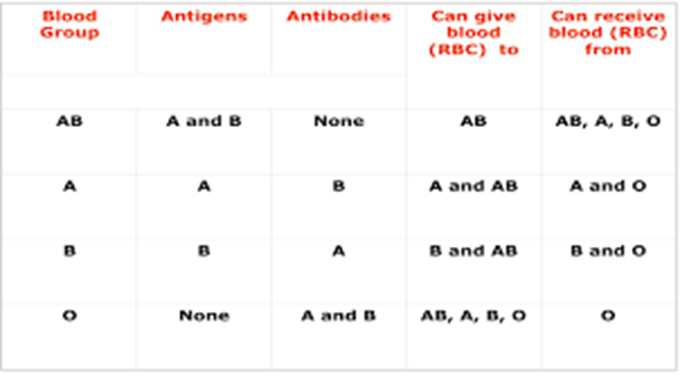An individual with which of the following blood types can receive all types of blood?
AB positive
A positive
B negative
O negative
The Correct Answer is A
a. AB positive: Individuals with AB positive blood are universal recipients. They have A and B antigens on their red blood cells but no antibodies (anti-A or anti-B) in their plasma. Therefore, their body will not reject blood types A, B, AB, or Rh positive or negative.
b. A positive: Individuals with A positive blood can only receive A positive or O positive blood. Their plasma contains anti-B antibodies, which would attack blood types B and AB.
c. B negative: Individuals with B negative blood can receive B negative or O negative blood. Their plasma contains anti-A antibodies, which would attack blood types A and AB. The Rh factor is another compatibility consideration, but the question specifies positive.
d. O negative: Individuals with O negative blood are universal donors but not universal recipients. Their red blood cells lack A and B antigens, so they can be donated to anyone. However, their plasma contains anti-A and anti-B antibodies, so they can only receive O negative blood.

Nursing Test Bank
Naxlex Comprehensive Predictor Exams
Related Questions
Correct Answer is B
Explanation
a: Artificial passive - Artificial passive immunity involves the transfer of pre-made antibodies from one individual to another, such as through injection of immune serum or administration of antibodies produced in a laboratory.
b. Artificial active: Artificial active immunity is acquired through vaccination, where a person's immune system is exposed to a weakened or inactive form of a pathogen, such as the varicella (chickenpox) virus, to stimulate an immune response and the production of antibodies.
c: Natural active - Natural active immunity occurs when a person is exposed to a pathogen in the environment and develops an immune response, such as contracting and recovering from a disease like chickenpox.
d: Natural passive - Natural passive immunity involves the transfer of antibodies from a mother to her baby, such as through breastfeeding or placental transfer of antibodies during pregnancy.
Correct Answer is A
Explanation
a. Cartilage: Cartilage is a type of connective tissue found at the ends of bones in joints. It provides a smooth, elastic surface that cushions the bones and reduces friction during movement.
b. Tendon: Tendons are tough, fibrous bands that connect muscles to bones. They do not reduce friction at joints.
c. Fibrillin: Fibrillin is a protein component of connective tissue, but it's not a specific structure like cartilage and doesn't directly reduce friction in joints.
d. Osteocytes: Osteocytes are mature bone cells. They are not located at joints and don't play a role in friction reduction.
Whether you are a student looking to ace your exams or a practicing nurse seeking to enhance your expertise , our nursing education contents will empower you with the confidence and competence to make a difference in the lives of patients and become a respected leader in the healthcare field.
Visit Naxlex, invest in your future and unlock endless possibilities with our unparalleled nursing education contents today
Report Wrong Answer on the Current Question
Do you disagree with the answer? If yes, what is your expected answer? Explain.
Kindly be descriptive with the issue you are facing.
